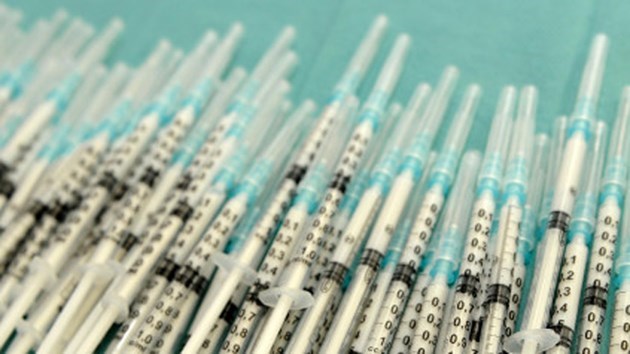Public Health Sudbury and Districts' needle exchange program handed out more than 1.2 million needles last year.
That number has steadily climbed from 791,000 in 2015, to nearly 850,000 in 2016.
The organization's harm reduction program, The POINT, has been in operation for a number of years and provides clean needles to drug users in an effort to prevent the spread of diseases and infections.
The service also acts as a return site for used, and in 2017 a total of 761,812 needles were returned, or a 63 per cent return rate.
Board members at PHSD were given a look at the statistics during their meeting on Feb. 15 in their year in review presentation.
While the numbers are quite staggering, PHSD medical officer of health and CEO Penny Sutcliffe says that on a per capita basis, Sudbury sits around the provincial average in terms of the number of needles being doled out and returned.
In 2017, The POINT saw 17,779 client visits, averaging out to roughly 68 needles per client per visit. The visits are not counted as unique client contacts, as a number of them are repeat visitors to the program.
The numbers caught the attention board member Robert Kirwan who questioned the protocol when it comes to handing out the needles.
"How are these needles distributed? You divide 17,000 into 1.2 million that's more than 50 needles per visit given out, so how many needles are given out to a client when they visit?" said Kirwin.
Director of clinical services at PHSD, Dr. Ariella Zbar explained that there aren't any limits in place and that needles are given out on an as-needed basis.
"We go by what the client does request and it's in relation to the type of drug being used," said Zbar. "Often times, especially during the summer there were drugs with shorter half-lives, which would require more needles in order to maintain the desired effect of the drug. Sometimes they would be stockpiling the needles away."
Sudbury does sit somewhere in the middle in relation to province-wide needle use, according to Sutcliffe, who says that numbers are up all over the province when it comes to the number of needles that are being handed out.
"We are seeing not a small increase but a big increase in the numbers of needles that we are handing out, we meaning the system, not just Sudbury but across the entire province," said Sutcliffe.
"The bad news about this is people are using more, and using shorter-lasting drugs, but the good news about that is they're getting clean needles. It's a crisis, do I want people to be using needles? Absolutely not, but if they're going to, do I want them to be clean? Absolutely."
Kirwan on the other hand, feels that the program could lead to normalizing illegal activity. The Ward 5 councillor was vocally opposed to bringing a safe injection site during a Feb. 5 community services committee meeting.
"I'm a little bit concerned that we may be normalizing illegal activity that police are trying to curtail in terms of possession and distribution," said Kirwan, who says that making it more difficult to access needles could be a preventative measure against people injecting drugs.
"I'm one of these people that thinks fear is a great motivator, and I have faith in young people who are being exposed to these drugs where if they had a hard time getting syringes, or thought 'I'm not going to use a syringe that someone else has used' then they may avoid participating. Handing out 75 syringes on every visit, that's like saying 'don't worry I've got clean syringes' I don't want to make it easier for young people to try this stuff and get hooked on it."
PHSD board chair René Lapierre says that the harm reduction benefits associated with the needle exchange program outweighs the risks.
"There is a risk associated with this, but having hundreds of people with Hepatitis or HIV or other infectious diseases that can happen from needle sharing...to be able to offer that safety to not only the people using, but the people who come into contact with them," said Lapierre.
In response to Kirwan's stance of making needles more difficult to obtain, Lapierre feels that it would do more harm than good.
"In the past when these programs started there was discussion about (what this would look like) but then it was more related to, if you start putting in too many rules and regulations and specifics, they won't come," said Lapierre.
"If our users feel comfortable that this is a private, no questions asked exchanged you'll get more and more people coming in to get clean needles versus using old needles or maybe someone else's."
